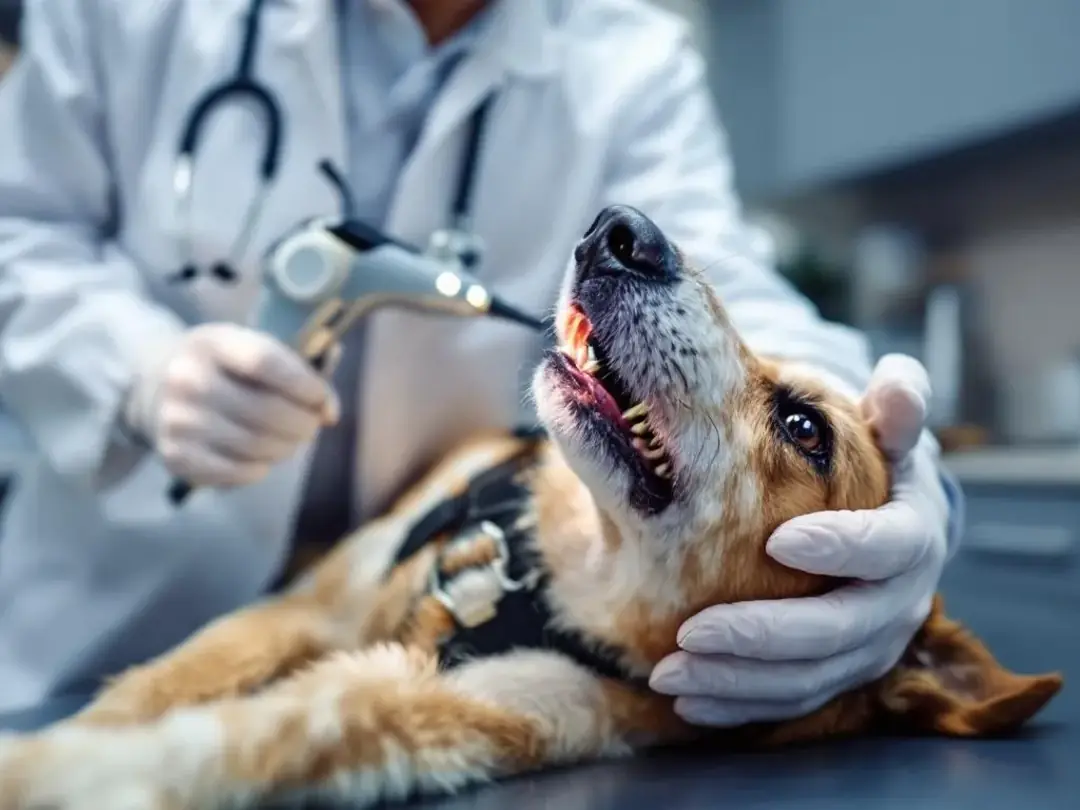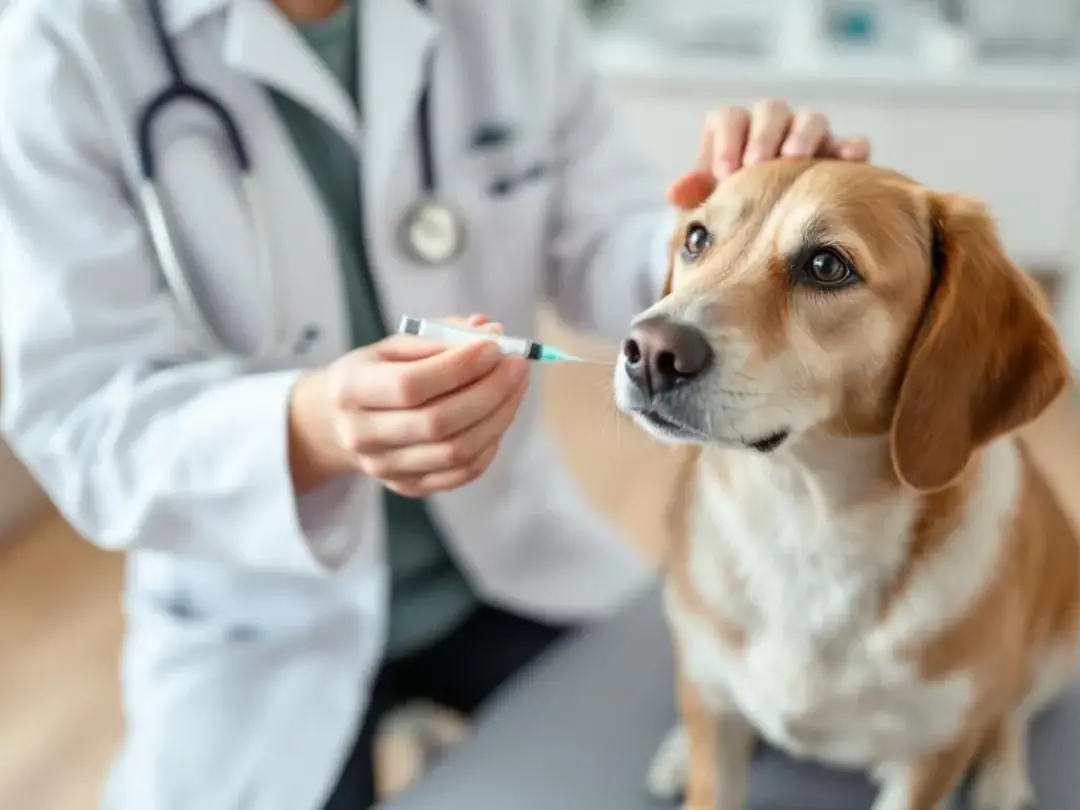Key Takeaways
-
Kennel cough is a highly contagious respiratory infection that causes a distinctive dry, honking cough in dogs
-
It spreads rapidly in crowded environments like boarding facilities, dog parks, and daycare centers through airborne droplets and direct contact
-
Most cases resolve naturally within 10-14 days with supportive care, though severe cases may require veterinary treatment
-
Vaccination against Bordetella bronchiseptica and other pathogens significantly reduces infection risk
-
Early isolation of infected dogs prevents spread to other pets in the household or community
What is Kennel Cough in Dogs?
Kennel cough, scientifically known as canine infectious respiratory disease complex (CIRD), is a syndrome affecting the upper respiratory tract of dogs. This condition is also referred to as infectious tracheobronchitis, reflecting its impact on the trachea and bronchi. Unlike human colds caused by a single virus, kennel cough results from infection by multiple pathogens working together to compromise your dog's respiratory system.
This respiratory disease affects dogs of all ages and breeds, though young puppies and older dogs face higher risks due to their developing or weakened immune systems. The condition ranks among the most common respiratory ailments seen in veterinary practice, with veterinarians diagnosing thousands of cases each year across animal shelters, boarding facilities, and private practices.
The infectious nature of kennel cough means that anywhere dogs congregate becomes a potential transmission site. From doggy daycare centers to dog shows, the disease spreads rapidly through susceptible populations, making prevention and early recognition crucial for pet owners.
Causes and Pathogens
The primary bacterial cause of kennel cough is Bordetella bronchiseptica, a pathogen that acts as the most common culprit behind those harsh, persistent coughs. This bacterium possesses specialized mechanisms that allow it to attach to and damage the protective lining of your dog's respiratory tract, creating ideal conditions for infection to take hold.
Several viral pathogens work alongside Bordetella to create the complex known as kennel cough. Canine parainfluenza virus frequently partners with bacterial infections, while canine adenovirus type 2 plays a dual role by causing mild respiratory symptoms and predisposing the airways to secondary bacterial infection. Canine influenza virus represents another significant viral contributor, with strains like H3N2 and H3N8 occasionally causing outbreaks in dog populations.
These pathogens rarely work alone. Co-infections involving multiple bacterial and viral agents are extremely common, explaining why kennel cough can vary dramatically in severity between infected dogs. The combination of pathogens damages the mucociliary escalator - your dog's natural defense system that normally sweeps debris and pathogens out of the respiratory tract.
Less common agents contributing to canine infectious respiratory disease include Mycoplasma species, canine respiratory coronavirus, and in severe cases, canine distemper virus. This complex web of potential infectious agents makes kennel cough a challenging condition to prevent completely, even with vaccination.


How Even When Kennel Cough Treated Still Spreads
Understanding transmission patterns helps explain why kennel cough spreads so rapidly in certain environments. The primary route involves airborne respiratory droplets released when infected dogs cough, sneeze, or even bark enthusiastically. These microscopic droplets can travel several feet, making transmission possible even without direct contact between dogs.
Direct contact represents another major transmission pathway. When dogs engage in nose-to-nose greetings, play behavior, or share close quarters, pathogens transfer easily between animals. This explains why dog parks, training centers, and doggie day care centers see frequent outbreaks, especially during peak activity periods.
Contaminated surfaces, known as fomites, serve as indirect transmission sources that many pet owners overlook. Water bowls, food dishes, toys, leashes, and even kennel surfaces can harbor infectious agents for hours or days. An infected dog drinking from a communal water bowl can contaminate the surface for the next healthy dog to encounter.
High-risk environments share common characteristics: poor ventilation, overcrowding, and stress factors that compromise immune function. Boarding facilities, grooming salons, pet stores, and even veterinary clinics can facilitate transmission if proper protocols aren't followed. The incubation period following exposure typically ranges from 2-14 days, during which dogs may shed pathogens before showing symptoms.
Environmental factors like temperature fluctuations, humidity changes, and poor air quality increase susceptibility by stressing the respiratory system's natural defenses. This explains why outbreaks often coincide with seasonal changes or occur in poorly ventilated indoor facilities.
Kennel Cough Contagious Dogs Can Quickly Run through a Faciliity
The hallmark symptom of kennel cough is a dry, harsh, honking cough that sounds distinctly different from other types of coughing in dogs. Pet owners often describe this sound as resembling a goose honk or the noise made when clearing one's throat forcefully. This characteristic cough typically begins suddenly and may occur in paroxysmal episodes throughout the day.
Additional symptoms accompanying the primary cough include clear nasal discharge, mild sneezing, and occasional eye discharge. Many dogs maintain normal energy levels and appetite during the early stages, which can make the condition seem less serious than it actually is. However, the persistent nature of the cough often becomes the most noticeable and concerning symptom for owners.
The coughing episodes frequently worsen with excitement, exercise, or when pressure is applied to the throat area. Even gentle collar pressure during walks can trigger severe coughing fits, leading many veterinarians to recommend switching to harnesses during recovery. Some dogs develop a dry, gagging motion at the end of coughing episodes, as if trying to clear something from their throat.
Common symptoms progress in a predictable pattern. Initial signs include the development of the characteristic dry cough, followed by increasing frequency and intensity of episodes. Mild lethargy and decreased appetite may appear as the dog's body fights the infection. In uncomplicated cases, these symptoms peak within the first week before gradually improving.
Severe signs indicate progression to more serious complications. Dogs developing labored breathing, persistent fever, productive cough with colored discharge, or complete loss of appetite require immediate veterinary attention. These symptoms suggest potential progression to pneumonia or other secondary infections that can become life-threatening without proper treatment.
When to Seek Veterinary Care
Certain situations warrant immediate veterinary attention, regardless of how mild the initial symptoms appear. Difficulty breathing, persistent fever above 103°F (39.4°C), or complete loss of appetite for more than 24 hours indicate potential complications requiring professional intervention.
The duration of symptoms provides another crucial indicator for seeking care. While most cases of kennel cough resolve within 2-3 weeks, persistent symptoms beyond this timeframe suggest either secondary complications or an alternative diagnosis requiring investigation.
Young puppies under 6 months and senior dogs showing any respiratory symptoms should receive prompt veterinary evaluation. These age groups face higher risks of rapid progression to severe disease due to immature or compromised immune systems. Similarly, dogs with underlying health conditions like heart disease, diabetes, or previous respiratory problems require immediate assessment.


Diagnosis of Kennel Cough
Veterinarians typically diagnose kennel cough based on clinical signs combined with a history of recent exposure to high-risk environments. The characteristic honking cough, especially when coupled with a recent visit to boarding facilities, dog parks, or other locations where many dogs gather, strongly suggests the diagnosis.
Physical examination reveals specific findings that support the diagnosis. Gentle pressure applied to the trachea often triggers immediate coughing episodes, a finding called tracheal sensitivity. This simple test helps differentiate kennel cough from other respiratory conditions with different underlying causes.
Recording cough episodes on video can provide valuable diagnostic information for your veterinarian. The sound, frequency, and triggers for coughing help distinguish kennel cough from conditions like heart disease, collapsing trachea, or allergic respiratory disease. Many pet owners find that their dogs don't cough during veterinary visits, making home videos particularly helpful.
Advanced diagnostic testing becomes necessary when standard treatments fail or complications develop. Chest X-rays help rule out pneumonia and other structural lung problems. Polymerase chain reaction (PCR) testing can identify specific pathogens involved, though results rarely change treatment approaches in straightforward cases.
The differential diagnosis process involves ruling out other causes of coughing in dogs. Heart disease, particularly in older dogs, can cause coughing that mimics kennel cough. Collapsing trachea, foreign body aspiration, and allergic bronchitis represent other conditions requiring different treatment approaches.
Treatment Options for Kennel Cough
Most cases of uncomplicated kennel cough respond well to supportive care without requiring aggressive medical intervention. The goal involves keeping your dog comfortable while their immune system clears the infection naturally. This approach works effectively for healthy adult dogs with typical presentations.
Prescribed medications target specific aspects of the condition when symptoms become severe or prolonged. Cough suppressants like dextromethorphan or hydrocodone may be recommended for dogs experiencing frequent, non-productive coughing that interferes with rest or eating. However, these medications should only be used under veterinary guidance, as productive coughs serve important functions in clearing respiratory secretions.
Antibiotic therapy becomes necessary when bacterial infection is suspected or confirmed. Doxycycline represents the first-choice antibiotic for treating Bordetella bronchiseptica and other common bacterial pathogens. Azithromycin and Clavamox serve as alternative options for dogs unable to tolerate doxycycline or when resistance patterns suggest different choices.
Treatment duration typically spans 7-10 days, depending on the severity of clinical signs and individual response. Most dogs show improvement within 48-72 hours of starting appropriate therapy, though complete resolution may take several weeks. Failure to improve within this timeframe warrants reassessment for complications or alternative diagnoses.
Severe cases progressing to pneumonia require hospitalization and intensive supportive care. Treatment may include intravenous fluids, oxygen supplementation, nebulization therapy, and injectable antibiotics. These cases represent a small percentage of total kennel cough infections but require immediate professional intervention.
Home Care Management
Proper home care significantly impacts recovery speed and comfort during illness. Switching from collars to harnesses eliminates pressure on the trachea that can trigger severe coughing episodes. This simple change often provides immediate relief and prevents trauma to already irritated airways.
Creating a warm, humid environment helps soothe irritated respiratory tissues. Running hot showers to create steam in bathrooms or using cool-mist humidifiers can provide relief, especially during coughing episodes. Avoid exposing dogs to smoke, strong fragrances, or other airborne irritants that might worsen symptoms.
Rest represents a crucial component of recovery that many active dogs resist. Limiting exercise and encouraging quiet activities helps prevent exhaustion and allows the immune system to focus on fighting infection. Short, calm walks for elimination needs are acceptable, but avoid vigorous play or training sessions.
Maintaining proper nutrition and hydration supports immune function during recovery. Some dogs experience decreased appetite due to throat discomfort, making soft or wet foods more appealing than dry kibble. Ensuring access to fresh water encourages adequate hydration, which helps thin respiratory secretions.
Isolation from other pets prevents spread within households and to community animals. Infected dogs should remain separated from healthy pets for a minimum of 2 weeks after symptoms completely resolve. This timeframe accounts for continued pathogen shedding that may occur even after clinical improvement.
Recovery Timeline and Prognosis
The typical recovery period for uncomplicated kennel cough spans 10-14 days, though individual variation is common. Most dogs begin showing improvement within the first week, with gradual reduction in coughing frequency and intensity. Complete resolution may take up to three weeks in some cases, particularly in dogs with multiple pathogens involved.
Several factors influence recovery speed and outcome. Young, healthy adult dogs typically recover fastest, while puppies and senior dogs may require longer healing periods. The specific pathogens involved, overall immune status, and promptness of treatment all impact recovery trajectories.
Signs of improvement include reduced coughing frequency, especially during rest periods, and increased energy levels. Dogs often show renewed interest in food and activities as their respiratory discomfort decreases. The harsh, dry cough may transition to a softer, less frequent sound before disappearing entirely.
Potential complications in untreated or severe cases can lead to pneumonia, chronic bronchitis, or secondary bacterial infections involving other organ systems. These complications explain why veterinary monitoring is important, even for apparently mild cases. Early intervention prevents most serious outcomes.
Long-term immunity following recovery typically lasts 6-12 months, though this varies based on the specific pathogens involved and individual immune response. Dogs can contract kennel cough multiple times throughout their lives, as immunity wanes and new pathogen strains emerge in dog populations.


Prevention Strategies
Vaccination represents the most effective prevention strategy against kennel cough, though no vaccine provides 100% protection against all possible pathogens. The intranasal vaccine targeting Bordetella bronchiseptica offers rapid protection, often within days of administration, making it valuable for dogs entering high-risk situations quickly.
Core vaccines including DHPP (distemper, hepatitis, parvovirus, parainfluenza) provide protection against canine adenovirus type 2 and parainfluenza virus, two important components of kennel cough syndrome. These vaccines form part of standard puppy series and require regular boosters throughout adult life for optimal protection.
Canine influenza vaccination has become increasingly important as these viruses spread through dog populations. Dogs attending dog shows, boarding frequently, or living in areas with known canine influenza circulation benefit from this additional protection. The vaccine requires an initial series followed by annual boosters.
Vaccination timing requires coordination with your veterinarian to ensure optimal protection. Initial vaccine series in puppies should be completed before exposure to high-risk environments. Adult dogs need annual boosters, with some high-risk individuals requiring more frequent Bordetella vaccination every 6 months.
Vaccination limitations must be understood by pet owners. Vaccines reduce disease severity and duration but may not prevent all infections, especially when dogs encounter novel pathogen strains or overwhelming infectious doses. Additionally, vaccines require time to develop immunity, so recent vaccination doesn't guarantee immediate protection.
Environmental Prevention
Choosing reputable boarding facilities with proper ventilation and cleaning protocols significantly reduces transmission risk. Quality facilities maintain appropriate dog-to-space ratios, implement isolation protocols for sick animals, and require up-to-date vaccination records for all residents.
Avoiding overcrowded dog parks during peak hours helps limit exposure opportunities. Early morning or late evening visits often provide less crowded environments where transmission risk is lower. Observing other dogs for signs of illness before allowing interaction provides additional protection.
Consider in-home pet sitting alternatives when possible, especially for dogs at higher risk due to age or health status. Professional pet sitters can provide personalized care without the exposure risks associated with boarding facilities or daycare facilities.
Maintaining good hygiene practices includes regular cleaning of food and water bowls, especially after visits to public areas. Washing hands between handling different dogs and avoiding sharing toys or equipment between households helps break transmission chains.
Proper ventilation in multi-dog households becomes crucial when one dog develops kennel cough. Opening windows, using fans to improve air circulation, and separating infected dogs to well-ventilated areas reduces transmission risk to other household pets.
Special Considerations
Young puppies under 16 weeks face increased vulnerability due to their immature immune systems and incomplete vaccination series. These dogs require extra precautions, including avoiding high-risk environments until vaccination series are complete and immunity develops. Even mild symptoms in puppies warrant immediate veterinary evaluation.
Senior dogs and those with underlying conditions like heart disease, diabetes, or respiratory disorders face higher risks of severe complications. These dogs may progress more rapidly to pneumonia or experience prolonged recovery periods. Preventive vaccination becomes especially important for this population.
Brachycephalic breeds (dogs with shortened faces) such as bulldogs, pugs, and Boston terriers face additional challenges due to their respiratory anatomy. Their compressed airways already compromise breathing efficiency, making them more susceptible to severe symptoms and complications from respiratory infections.
Pregnancy considerations require careful coordination with veterinary professionals. Pregnant dogs should avoid high-risk environments, and vaccination timing must be planned to protect both mother and developing puppies. Some vaccines may not be appropriate during pregnancy, requiring alternative protection strategies.
Human transmission, while rare, can occur in immunocompromised individuals. Bordetella bronchiseptica occasionally causes respiratory symptoms in people with weakened immune systems. Proper hygiene and handwashing after handling infected dogs provides adequate protection for healthy individuals.
FAQ
Can kennel cough be transmitted to humans or cats?
While rare, Bordetella bronchiseptica can occasionally infect immunocompromised humans, causing mild respiratory symptoms. Healthy individuals face minimal risk. Cats can contract Bordetella, though feline respiratory infections more commonly involve different pathogens. Proper hygiene, including handwashing after handling infected animals, provides adequate protection for most people.
How long should I keep my dog isolated after kennel cough diagnosis?
Infected dogs should remain isolated from other pets for a minimum of 2 weeks after all symptoms completely resolve. Dogs continue shedding infectious pathogens even after appearing recovered, making this extended isolation period crucial for preventing spread to other animals in the household or community.
Is it safe to use human cough medicine for my dog with kennel cough?
Never give human cough medications to dogs without explicit veterinary approval. Many human formulations contain ingredients like xylitol or acetaminophen that are toxic to dogs. Even seemingly safe ingredients require proper dosing calculations based on your dog's weight and medical status. Always consult your veterinarian before administering any medications.
Can my dog get kennel cough multiple times throughout their life?
Yes, dogs can contract kennel cough repeatedly due to waning immunity and exposure to different pathogen strains. Natural immunity typically lasts 6-12 months, while vaccination provides variable protection periods. Multiple kennel cough episodes don't indicate vaccine failure but rather reflect the complex nature of this multi-pathogen syndrome.
What's the difference between kennel cough and canine influenza?
Canine influenza virus can contribute to kennel cough syndrome, but true canine influenza typically causes more severe symptoms including high fever, lethargy, and sometimes pneumonia. Kennel cough usually involves milder symptoms dominated by the characteristic dry cough. Canine influenza also spreads more easily between dogs and may require different treatment approaches. Accurate diagnosis often requires laboratory testing to distinguish between these conditions.






